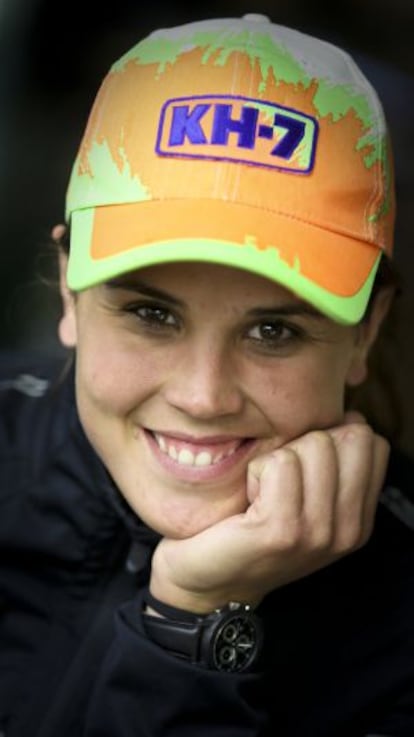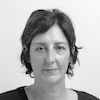“The Dakar is made for suffering, whether you’re a man or a woman”
Motorcycle racer Laia Sanz discusses the challenges of the world's toughest rally

The plan was to treat her to an afternoon tea and chat about her experience at this year's Dakar Rally - both as a racer and as a woman who has spent her life fighting her way to the top in a world that's dominated by men. But Laia Sanz's busy schedule meant that by the time she arrived, dragging a suitcase behind her and looking tired, it was nearly dinner time, and she had already made plans to meet friends later that night.
So the interview got straight to the point, focusing on her fourth time competing in the world's most dangerous rally, a test that, they say, leaves its mark on all of the drivers and riders that take part - not so much for its sporting challenges, but rather its personal ones. But the Catalan rider managed greater success than she could have imagined possible before the two-week event in South America: she finished first in the female motorcycling category; she was the only woman who managed to cross the finish line; and she came 16th in the general classification, which for her is the most important achievement. And she managed all of that without preparing for the specific demands of the event, something that many of her rivals do as a matter of course.
Sanz remembers her father letting her get on a motorbike when she was barely four years old - "And he let me open the throttle!" But she has no clear memory of the first time she rode completely alone. During her career she has won 13 world trial championships, as well as an enduro title. And competing against a mostly male field has always given her the motivation she needs.
So is the Dakar Rally as tough as it looks? "Yes," comes the reply. "The worst part is not being able to sleep. The first week I didn't manage to sleep before 11pm, and we had to get up at 3 or 3.30am. When you've spent 10 or 12 hours on the motorbike each day for two weeks, it gets really tough."
You end up as just another rider"
That buildup of tiredness is even worse than the hundreds of kilometers that she had to traverse on her bike, completely alone, dealing with sand dunes and every kind of terrain imaginable. But Sanz likes that sensation.
"From up high you can see the entire landscape," she explains. "Which I love. I don't feel alone." But she did at times get scared during the rally.
"In particular when you see accidents or you hear about something bad happening," she explains. "And something bad happens every year." Given the danger, the 28-year-old would call her mother every night when the stage was over. "If I don't, she can't sleep," she says.
Nearly every day of the rally there are retirements and accidents, and the Dakar has left behind it a long list of victims, to which this year the name of the Belgian Eric Palante was added. "I saw a really nasty fall this year, around 20 kilometers before the end of the stage," Sanz explains. "You lose the will to open up the throttle - whether you want to or not, you end up easing off. But in the end you can't be thinking about that kind of stuff..."
Nor can she allow herself to think too much about being one of the few women taking part in the event. When asked whether the Dakar is designed for men, she doesn't hesitate to offer her response: "The Dakar is made for suffering, whether you're a man or a woman." Perhaps that suffering serves to bring together the competitors, because she says that there is "a very good atmosphere" between the riders, and that she has managed to avoid feeling different. Although that has not always been the case: "The first year perhaps they looked at me a bit strange, and if I wasn't performing well then they could say, 'She's just here because she's a woman.' But I think that by performing better and better each year in the end you carve out a place for yourself, and you earn respect. You end up being just another rider."
As such Sanz is determined to return to the Dakar, and hasn't ruled out competing in the car category. What she is less sure about is whether a woman will be able to win on a motorbike. "A woman has already won in a car, but on a bike... I wish," she says. "It won't be me. I think that whether we like it or not, physically there is a difference."
Tu suscripción se está usando en otro dispositivo
¿Quieres añadir otro usuario a tu suscripción?
Si continúas leyendo en este dispositivo, no se podrá leer en el otro.
FlechaTu suscripción se está usando en otro dispositivo y solo puedes acceder a EL PAÍS desde un dispositivo a la vez.
Si quieres compartir tu cuenta, cambia tu suscripción a la modalidad Premium, así podrás añadir otro usuario. Cada uno accederá con su propia cuenta de email, lo que os permitirá personalizar vuestra experiencia en EL PAÍS.
¿Tienes una suscripción de empresa? Accede aquí para contratar más cuentas.
En el caso de no saber quién está usando tu cuenta, te recomendamos cambiar tu contraseña aquí.
Si decides continuar compartiendo tu cuenta, este mensaje se mostrará en tu dispositivo y en el de la otra persona que está usando tu cuenta de forma indefinida, afectando a tu experiencia de lectura. Puedes consultar aquí los términos y condiciones de la suscripción digital.









































